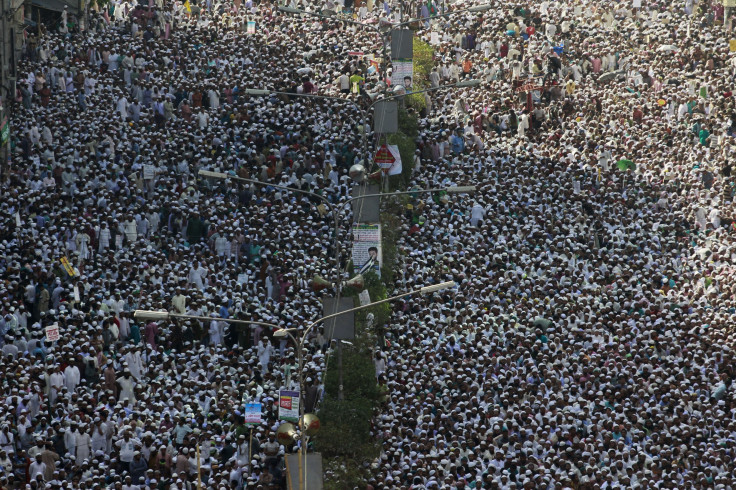Bangladesh Rejects Tougher Blasphemy Laws, As Islamic Fundamentalists Square Off Against Secular Liberals

The prime minister of Bangladesh has sought to strengthen her nation’s identity as a secular democracy by rejecting calls by Islamic extremists for the imposition of a blasphemy law, similar to legislation that is already on the books in Pakistan.
Sheikh Hasina insisted that existing laws were sufficient to prosecute those who choose to insult Islam or the Prophet Muhammad.
“They [the Islamists] should know that existing laws are enough. ... We don’t have any plan to [enact a blasphemy law since] we don’t need it,” Hasina told the BBC.
“This country is a secular democracy. So each and every religion has the right to practice their religion freely and fair. But it is not fair to hurt anybody's religious feeling. Always we try to protect every religious sentiment."
Under the existing 2006 Right to Information Act, someone convicted of hurting "religious sentiments" could potentially face a prison term of up to 10 years and pay a fine.
But that isn’t enough for ultra-right fundamentalist groups like Hefazat-e-Islam (HeI), who are demanding tougher punishments – up to and including the death penalty -- for those who commit blasphemy, particularly Internet bloggers whom they characterize as “atheists.”
HeI and other militant groups staged huge rallies in the capital city of Dhaka and other cities over the weekend to press the government to enact harsher anti-blasphemy laws and also called for a worker’s strike on Monday.
The rally by HeI was endorsed by the opposition Bangladesh Nationalist Party and Jamaat-e-Islami (JeI), the country’s largest Islamist party.
The Islamic fundamentalists have given the government a three-week deadline by which to upgrade the punishment for convicted blasphemers.
Beyond a call for the death penalty for blasphemy, HeI and its allies want the government to declare the minority Ahmadiyya Muslim sect non-Muslim; to impose a ban on men and women mixing in public; and to make Islamic education mandatory at all school levels.
The issue of blasphemy is also connected to the controversial subject of war crimes charges lodged against various Islamic leaders for their activities during the 1971 war of independence. During that conflict, right-wing Islamists, including those belonging to the JeI, opposed the separation of then East Pakistan from West Pakistan. Many were charged with aiding and abetting West Pakistani soldiers who came to East Pakistan to quell the rebellion. Two members have already been convicted.
JeI leaders are now calling for the release of their comrades from prison.
But liberals, some of whom are bloggers, have urged the government to resist pressure from the Islamists and prosecute the suspected war criminals – it is these bloggers that the Islamists sometimes accuse of engaging in blasphemy against the Muslim religion.
In February, a blogger who criticized the Islamic fundamentalists was murdered, apparently by those sympathetic to JeI.
As such, the government of Sheikh Hasina is caught between two dramatically opposing forces – Islamists who are demanding that Bangladesh become a truly Islamic state; and secular liberals who fear the encroaching power of groups like JeI.
Bangladesh Islamists would likely prefer to see their country adopt the rigid blasphemy laws adopted by Pakistan.
Under the penal code of Pakistan (which is officially designated as an Islamic republic), acts of blasphemy against Islam can be punished by anything up to and including death. No one in Pakistan has yet been executed for blasphemy, as death sentences have consistently been overturned on appeal – but several of the accused have been murdered in prison while awaiting sentencing.
Indeed, a number of prominent Pakistani political figures – including Salman Taseer, the former governor of Punjab province; and Shabaz Bhatti, the former minister for minorities – have been assassinated for their opposition to the blasphemy laws.
The blasphemy laws in Pakistan – which are believed to be the strictest in the Muslim world – are a relatively recent phenomenon. When Gen. Muhammad Zia al-Haq seized power in 1979, he sought to gain support among religious radicals (as well as the conservative middle class) by accelerating the pace of Islamization and the introduction of Sharia laws.
However, what specifically constitutes “blasphemy” can be subject to broad interpretation and therein lie many problems. Hundreds of Pakistanis are currently languishing in prisons for allegedly violating the blasphemy laws – many are religious minorities, others were likely the victims of trumped-up charges.
"[The blasphemy law] was designed as an instrument of persecution," said Ali Hasan Dayan, of Human Rights Watch in Pakistan. "It's discriminatory and abusive."
Pakistan, like many Muslim and Third World countries, has deep schisms in its society -- a wealthy, liberal elite on one side that favors Western ideas on liberty and social freedoms; and extremist reactionary groups on the other side that are committed to removing any "stain" of Westernization (in Pakistan’s case, these are radical fundamentalist Islamists).
An overwhelming 90 percent of Bangladesh’s population is Muslim, making it the world’s fourth biggest Islamic country.
While Bangladesh’s constitution established Islam as the state religion, other religions are permitted, although the country’s Hindu, Buddhist and Christian communities frequently complain of discrimination.
© Copyright IBTimes 2024. All rights reserved.




















